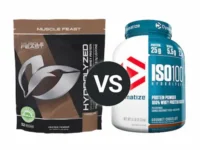Knowledge BaseYou're Questions Answered
Can whey protein lower cholesterol?
Yes, whey protein has been shown to have potential benefits in lowering cholesterol levels, particularly LDL (low-density lipoprotein) cholesterol, which is often referred to as "bad" cholesterol. Several studies suggest that the consumption of whey protein can lead to a reduction in total cholesterol and LDL levels in both healthy individuals and those with high cholesterol1.
The cholesterol-lowering effects of whey protein are believed to be due to several factors. Whey protein is rich in a range of bioactive compounds, including lactokinins, which have been shown to have blood pressure-lowering effects and may also impact cholesterol metabolism2. Additionally, whey protein can enhance the production of glutathione, an antioxidant that helps protect cells from oxidative stress and inflammation, which are known contributors to cardiovascular disease3.
While the research is promising, it is important to note that whey protein should not be seen as a sole treatment for high cholesterol. It can be a complementary approach alongside a balanced diet rich in fruits, vegetables, whole grains, and healthy fats. Regular exercise and lifestyle modifications are also crucial components of effective cholesterol management4.
Individuals considering using whey protein to help manage cholesterol levels should consult with a healthcare provider to ensure that it is appropriate for their health needs and that it fits into their overall dietary plan5.
- Pal, S., & Ellis, V. (2010). The chronic effects of whey proteins on blood pressure, vascular function, and inflammatory markers in overweight individuals. Obesity, 18(7), 1354-1359.
- Krissansen, G. W. (2007). Emerging health properties of whey proteins and their clinical implications. Journal of the American College of Nutrition, 26(6), 713S-723S.
- Marshall, K. (2004). Therapeutic applications of whey protein. Alternative Medicine Review, 9(2), 136-156.
- Fekete, Á. A., Giromini, C., Chatzidiakou, Y., Givens, D. I., & Lovegrove, J. A. (2016). Whey protein lowers blood pressure and improves endothelial function and lipid biomarkers in adults with prehypertension and mild hypertension: a randomized controlled trial. The American Journal of Clinical Nutrition, 104(6), 1534-1544.
- Hoffman, J. R., & Falvo, M. J. (2004). Protein – Which is Best? Journal of Sports Science and Medicine, 3(3), 118-130.
Related Questions

Your Answer
We are a participant in the Amazon Services LLC Associates Program, an affiliate advertising program designed to provide a means for us to earn fees by linking to Amazon.com and affiliated sites.






